Chicago Cubs: Changes coming to the collective bargaining agreement

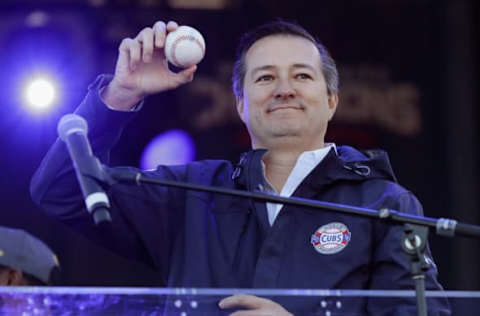
The last two offseasons have been so painfully slow that changes to MLB collective bargaining agreement seem inevitable. So I’ve been thinking, how would I change the CBA if it was up to me? And how would it affect the Chicago Cubs?
The collective bargaining agreement is the agreement between Major League Baseball and the Players Association. It determines everything from free agency, salary arbitration, luxury tax as well as the disabled list, paternity list, bereavement list and even the system the commissioner must follow to make rule changes such as a pitch clock.
The players union and their agents are especially upset at how difficult it has been for free agents to make new deals. In many cases, players have had to settle for contracts that are much shorter and salaries that are much lower than would have expected just two years ago.
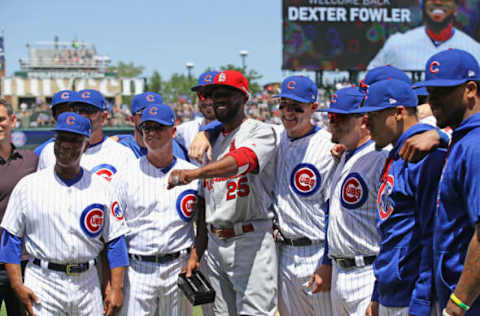
Chicago Cubs can thank draft pick compensation for Dexter Fowler’s surprise reunion with the Cubs in 2016.
When a player becomes a free agent their team has the option to offer that player a one year contract called a qualifying offer. If the player refuses the qualifying offer and then signs with another team the player’s new team loses a draft pick and the original team gets draft pick compensation in the next amateur draft.
It used to be that these draft picks were first round draft picks. But in the last revision to the collective bargaining agreement, these picks could vary depending on the market size of the team. The worst draft pick a team can now lose is a second round pick.
Players also can now only receive a qualifying offer once in their career. Thus a player can only be tied to draft pick compensation once.
In recent years this has impacted the Cubs and Cubs players quite a bit. When the Cubs signed Jason Heyward and John Lackey before the 2016 season, the Cubs lost their two highest draft picks that year because both players declined qualifying offers.
After the 2016 season, the Cubs received an additional draft pick at the end of the first round because Dexter Fowler signed with the St. Louis Cardinals. However, after the 2017 season, and the changes to the CBA, the Cubs only received two second-round picks when both Jake Arrieta and Wade Davis signed with other teams.
But the poster child for a change to this system is Fowler. After the 2015 season, he declined the Cubs qualifying offer. That offseason it appeared Fowler was going to sign a multi-year deal with the Baltimore Orioles. But when at the last minute the Orioles demanded Fowler compensate them for the loss of a draft pick by accepting less money, he refused to sign with them.
Luckily this turned out to be good news for the Cubs, as it resulted in a surprise reunion with Fowler. Fowler went on to make big contributions that helped the Cubs win the 2016 World Series.
It seems clear to me that there is nothing wrong with giving the teams draft picks to compensate them for lost free agents. However, being tied to draft pick compensation can lower the value of free agents. I’m surprised that the players association agreed to it or that they failed to anticipate how it would negatively impact players’ salaries.
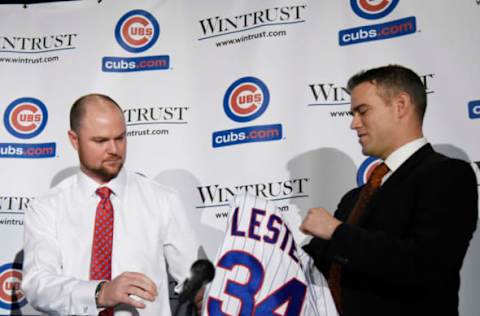
Chicago Cubs didn’t lose a draft pick when they signed Jon Lester.
Adding that a player can only receive qualifying offer once in his career was a nice adjustment to the last CBA. However, that assumes that acquiring teams are going to be penalized draft picks for signing free agents who declined qualifying offers. If in a future version of the CBA acquiring teams aren’t going to lose a draft pick, then players won’t care how many qualifying offers they receive in their career.
Players’ value won’t be hurt by qualifying offers if the team that signs them doesn’t have to worry about losing draft picks. It will actually give some players an additional contract possibility to consider that occasionally will be a good fit.
It also seems strange that some players can be tied to draft pick compensation while other players can’t if they were traded during the season before they reached free agency. When the Cubs signed Jon Lester to a free agent contract they didn’t have to worry about losing a draft pick because he was traded from the Red Sox to the Athletics just before he became a free agent.
I don’t think draft pick compensation has made much of an impact on players at the top of the market. When the Cubs signed Heyward, I don’t think the draft pick compensation factored into the decision at all.
Theo Epstein is one of the reasons players can’t be tied to draft pick compensation if they are traded in their final season before free agency. In 2004 the Epstein led Red Sox traded for shortstop Orlando Cabrera in midseason. Cabrera then left as a free agent. The Red Sox signed Edgar Rentería, a very similar player, to replace Cabrera. Because Epstein and the Red Sox signed Rentería instead of resigning Cabrera they earned an additional draft pick. That draft pick ended up being Jacoby Ellsbury. Epstein had figure out how to game the system.
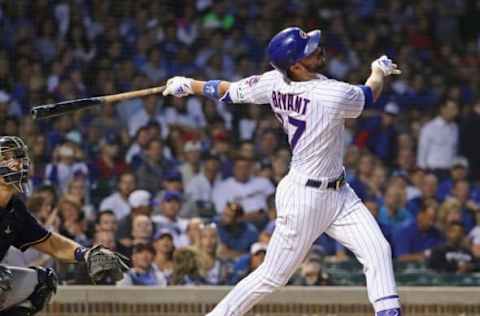
Chicago Cubs: Kris Bryant’s service time issue is still controversial today.
If a rookie is on a team’s Major League roster or disabled list for 172 days of the season he earns a full year of service time. That seems simple enough, but once again Epstein found the flaw with this system.
In 2015 Kris Bryant wasn’t called up until he could only earn 171 days of service time. The result is that the Cubs will get an additional year of team control. It will take Bryant one more year to become a free agent because in his rookie year he wasn’t called up to the majors one day earlier. This is still seen as controversial even today.
The Braves made the opposite decision with Heyward. In 2010 Heyward made his major league debut on opening day. However, this decision meant that he became a free agent after the 2015 season. If the Braves had just waited a few weeks before calling him up, he wouldn’t have been a free agent until after the 2016 season.
This phenomena also discourages teams from calling up their best prospects at the end of the season. Former Cub farmhand Eloy Jiménez was a victim of the service time issue at the end of last season.
It used to be that teams would call up their best prospects after rosters expand on September 1st to get them a taste of playing at the major league level. If teams thought that their prospect had a chance of winning the Rookie of Year Award they would make sure that he didn’t play so much that he lost his rookie status.
I would like to see a system put in the collective bargaining agreement that encouraged teams to not only have rookies on the Opening Day roster but also call them up in September if teams think that they are ready. Major League Baseball is going to have to come to an agreement with the players association on just how many years of team control that teams are entitled to.
Once they do that I think that as long as a player will still have rookie status for the rookie of the year award going into a season then the team shouldn’t have to worry about a player getting to free agency a year early because the team didn’t wait a few weeks before calling the player up.
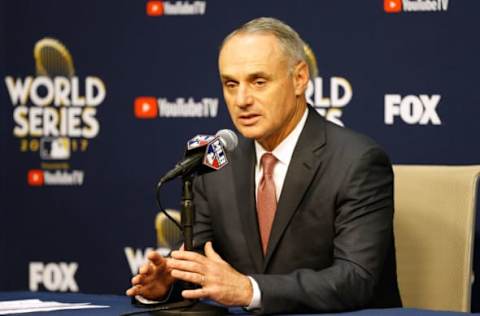
Chicago Cubs: Big market teams and players are hurt by the luxury tax.
The biggest issue with the current collective bargaining agreement is the luxury tax. If teams spend more than $206 million on player salary this season they are over the luxury tax. The further over the luxury tax and the more consecutive years a team is over the luxury the more severe the penalties.
In 2018 the Cubs, Dodgers and Yankees all stayed under the luxury tax to reset their penalties. That was at least one factor that led to last year’s slow offseason. Three of the biggest teams were trying to stay under the luxury tax.
This year according to a leaked internal memo for investors, the Dodgers are once again trying to stay under the luxury tax. The luxury tax is essentially becoming a salary cap. Even if a team doesn’t try to stay under it every year, the desire to reset the luxury tax encourages teams to stay close enough to it that they can get below it every few years or cycle down below it when a competitive window closes.
The luxury tax was put in place to help with the competitive balance between the big market teams and the small market teams. It might be helping with that a little bit. But it sure feels like the Yankees, Red Sox and Dodgers are only minimally impacted by the luxury tax. Whereas players limit how much the biggest spenders can spend both on superstar contracts and on depth players.
Now that the Cubs are finally spending like the big market team that they are, I don’t want them to be held back by the luxury tax. I’d like to see the luxury tax system done away with completely. I know the players, their agents and the large market teams would too. The only group that likes the luxury tax are the small market clubs. So why did the players agree to a luxury tax?
Perhaps the small market teams should be given a bigger piece of national broadcast and streaming deals instead of the current luxury tax system.
Next. Muncy better than Rizzo?. dark
Changes will be made to the next collective bargaining agreement. I hope that it doesn’t take a work stoppage for that to happen. I’m also hoping the changes make sense, fix some obvious problems and don’t unfairly disadvantage the Cubs.